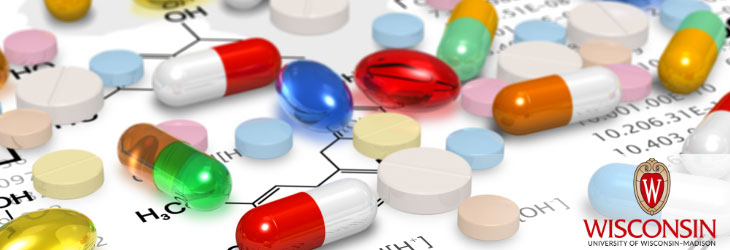Therapeutics & Vaccines

Preventing Type 1 Diabetes in Infants Using Natural and Modified Compounds to Improve Immune Tolerance to Insulin
WARF: P230019US01
Inventors: Michael MacDonald
The Wisconsin Alumni Research Foundation is seeking commercial partners interested in developing therapeutic compounds to reduce the risk of Type 1 diabetes (T1D) in infants and children. A team led by Dr. Michael MacDonald has shown that improving immune tolerance to insulin can dramatically reduce disease incidence in a mouse model of T1D.
Overview
Type 1 diabetes (T1D) is an autoimmune disease caused by the immune system’s destruction of insulin-producing pancreatic beta cells. To date, there is no preventative treatment, nor is there a cure for T1D. Development of a treatment to induce immune tolerance to insulin before the onset of immune attack on the pancreas could prevent T1D-prone individuals from facing a lifetime of elevated medical expenses and adverse health outcomes.
The Invention
UW-Madison researchers have developed methods of administering compounds—both naturally occurring plant derivatives and modified insulin peptides—that improve immune tolerance to insulin, thereby preventing T1D in at-risk individuals.
In T1D, the immune system’s destruction of the pancreatic beta cells is mediated by T cells identifying insulin and proinsulin as ‘foreign’ rather than as ‘self,’ and subsequently mounting an immune response. Cysteine is a highly reactive amino acid residue, and proteins containing cysteine are implicated in many autoimmune diseases, including insulin and proinsulin in T1D. The plant-derived, natural nucleophilic compounds of this T1D preventive technology bind to cysteine residues in native insulin and proinsulin, while the modified insulin peptides of this technology contain modified cysteine residues. Potentially, administering cysteine-binding chemicals or directly modified peptides early in life could create a non-native epitope and induce immune tolerance and prevent T1D.
In preclinical mouse trials, Dr. MacDonald’s team showed a 60–75% reduction in development of T1D in mice treated with the natural nucleophilic compounds, and a nearly 80% reduction in mice treated with the modified insulin peptides, as compared to controls. Based on these results, these compounds could be tested in human infants at high risk of T1D, starting in utero via administration to the gestating parent and/or continuing or starting directly in the newborn. The nucleophilic molecules are all already present in the food chain and generally regarded as safe (GRAS), and can be administered as part of the diet. The modified insulin peptides require administration by injection.
In T1D, the immune system’s destruction of the pancreatic beta cells is mediated by T cells identifying insulin and proinsulin as ‘foreign’ rather than as ‘self,’ and subsequently mounting an immune response. Cysteine is a highly reactive amino acid residue, and proteins containing cysteine are implicated in many autoimmune diseases, including insulin and proinsulin in T1D. The plant-derived, natural nucleophilic compounds of this T1D preventive technology bind to cysteine residues in native insulin and proinsulin, while the modified insulin peptides of this technology contain modified cysteine residues. Potentially, administering cysteine-binding chemicals or directly modified peptides early in life could create a non-native epitope and induce immune tolerance and prevent T1D.
In preclinical mouse trials, Dr. MacDonald’s team showed a 60–75% reduction in development of T1D in mice treated with the natural nucleophilic compounds, and a nearly 80% reduction in mice treated with the modified insulin peptides, as compared to controls. Based on these results, these compounds could be tested in human infants at high risk of T1D, starting in utero via administration to the gestating parent and/or continuing or starting directly in the newborn. The nucleophilic molecules are all already present in the food chain and generally regarded as safe (GRAS), and can be administered as part of the diet. The modified insulin peptides require administration by injection.
Applications
- Prevention of T1D
- The plant-derived nucleophilic molecules are GRAS, and could be developed as a medical food, marketed as a prescription infant formula for feeding alone or as a breastmilk supplement.
- The modified insulin peptides could be developed as an injectable to be administered to infants and children at risk of T1D, alongside vaccinations.
Key Benefits
- The naturally occurring nucleophilic molecules are all GRAS and present in the food chain.
- The modified insulin peptides have shown high efficacy (80% reduction) in preventing T1D in young mice at risk for the disease.
Stage of Development
In vitro work has been done in human pancreatic islets showing that the nucleophilic molecules bind to T1D autoantigens, proving the mechanism by which these molecules could reduce T1D incidence in human children. As well, preclinical studies in a nonobese diabetic (NOD) mouse model of T1D have shown that these plant-derived nucleophilic molecules and modified insulin peptides, alone or in combination, are efficacious in significantly reducing incidence of T1D.
Additional Information
For More Information About the Inventors
Tech Fields
For current licensing status, please contact Rafael Diaz at [javascript protected email address] or 608-960-9847